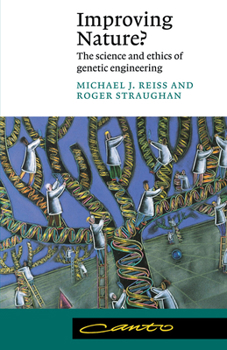Improving Nature?: The Science and Ethics of Genetic Engineering
Select Format
Select Condition 
Book Overview
Little more than a decade ago the term genetic engineering was hardly known outside research laboratories. Today it regularly makes headlines. Those in favor of genetic engineering--and those against it--tell us that it has the potential to change our lives perhaps more than any other scientific or technological advance. But what are the likely consequences of genetic engineering? Is it ethically acceptable? Should we be trying to improve on nature?...
Format:Paperback
Language:English
ISBN:0521008476
ISBN13:9780521008471
Release Date:May 2001
Publisher:Cambridge University Press
Length:302 Pages
Weight:0.95 lbs.
Dimensions:0.7" x 5.6" x 8.6"
Customer Reviews
2 ratings
Well written book on genes
Published by Thriftbooks.com User , 25 years ago
two main components, the science of genetic engineering with an excellent explanation of mutations, and the moral/ethical aspects of genetic engineering. They explain how already human genes have been put into pigs, how we may be able to change the genetic make-up of humans, and the genetic basis for making these species level changes in human's genetic code. R & S also give a great deal of time to explaining the different types of genetic mutations that occur. For example, a whole chromosome may be lost or gained, such as an extra copy of the small chromosome 21 that causes Down's Syndrome. Or part of a chromosome may be inverted put be fully intact. And they explain how dominant and recessive genes affect us and how they are transmitted from generation to generation. This is probably the best book reviewed here that deals with genetic and chromosomal mutations and how they interact to make us what we are, including the dangers of genetic engineering on humans. First, genes often work best when they are situated next to each other, and mistakes in insertion locations may interfere with tumor-suppressor genes. But these are all technical problems and there is good reason to believe they will be overcome as we complete the Human Genome Project. Less time is given to the ethics of genetic engineering by R & S, but again it is also the most controversial and interesting part of the book. They do point out that "Ethics is normally thought of as a narrower concept than morality, and it can be used in several different, though unrelated, senses. The most general of these suggests a set of standards by which a particular group or community decides to regulate its behavior--to distinguish what is legitimate or acceptable in pursuit of their aims from what is not, such as 'business ethics' or 'medical ethics'." What this means is that there can be no such thing as unethical practices in the pursuit of genetic engineering or eugenics, because any action deemed unethical has to be agreed upon by the participants, not imposed on them. The socialists forget this when they try to impose secular or politically motivated ethical standards on scientific procedures because they fear that the knowledge that may result will harm their egalitarian cause. (See Culture of Critique by MacDonald.) R & S then discuss the morality of genetic engineering, both intrinsic and extrinsic. Intrinsic being actions that are right and wrong on their own (based on religion, evolution, etc. ??) and extrinsic that only considers the beneficial consequences of actions. They do a good job of explaining these two positions, and how for example in the debate on abortion the two sides are arguing from different perspectives with regards to what is moral (extrinsic versus intrinsic). What they do fail to discuss is that if humans share a moral history with other primates based on reproductive success of the tribe, how can we apply morality to present da
Finally a good book about Genetic Engineering!!
Published by Thriftbooks.com User , 26 years ago
I am just a high school student, yet I undersood this book. It is great!!! It is not too technical, yet it covers what it needs to. Sections on plant, animal, and human genetic engineering make this book worth reading. No matter if you are a student with just an intrest, like me, or a genetic engineer yourself - you will enjoy this book. I get it a ten!!!





